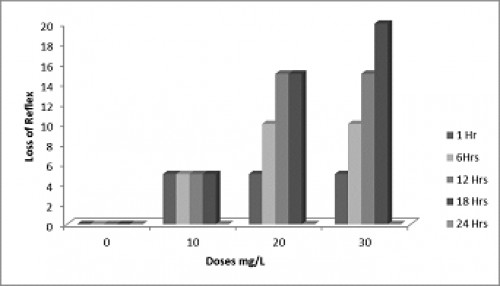Vol. 4, Issue 2, Part B (2017)
Bio-insecticidal efficacy of Moringa oleifera on the malaria vector, Anopheles and toxicity evaluation on fish behaviour
Author(s): Ohia Chinenyenwa MD and Ana Godson REE
Abstract: Mosquito control efforts are being undermined due to development of insecticide resistance in mosquito vectors of public health importance to synthetic insecticides, hence leading to the search for more sustainable control inputs. There is an increasing interest in developing plant-based insecticides as sustainable alternatives to chemical insecticides. Moringa oleifera extract was evaluated on Anopheles gambiae s.s. larvae and to limit potential toxic pollution of aquatic ecosystems, acute and sub-chronic toxicity bioassay experiments were carried out on adult male Poecilia reticulata (guppies) to determine its eco-toxicological impact. Three independent larvicidal experiments were replicated three times; the pattern of effectiveness and the LC50 were determined for the mosquito larvicide; the toxicity experiments were carried out in three replicates by static method and behavioural changes in the guppies were determined for the different concentration levels used and in relation to exposure time. Data from the bioassays were evaluated using Probit analyses statistical method; Descriptive analyses were also used to describe the toxicological effects of the extract on the guppies. The larval bioassay gave a dose-dependent ascendency of larval mortality and mortality records over the exposure period were significantly different among the treatment groups (p< 0.05); while the guppies exhibited varying degrees of behavioural effects that were concentration- and exposure-time dependent with a 24-hour LC50 of 36.4 (34.2-39.4)mg/L. The study showed that Moringa oleifera extract had larvicidal activity on Anopheles gambiae with minimal adverse behavioural effects on Poecilia reticulata, a natural control agent of mosquito. Hence, production of Moringa-based larvicides can be stimulated through local sourcing to reduce cost and promote sustainable research to develop insecticides based on bioactive natural chemical compounds from indigenous plant sources.
Related Graphics: Click here for more related graphics

Fig.: Effect of treatment doses on loss of reflex in mosquito fishes
Pages: 85-92 | 2714 Views 378 Downloads
How to cite this article:
Ohia Chinenyenwa MD, Ana Godson REE. Bio-insecticidal efficacy of Moringa oleifera on the malaria vector, Anopheles and toxicity evaluation on fish behaviour. Int J Mosq Res 2017;4(2):85-92.







